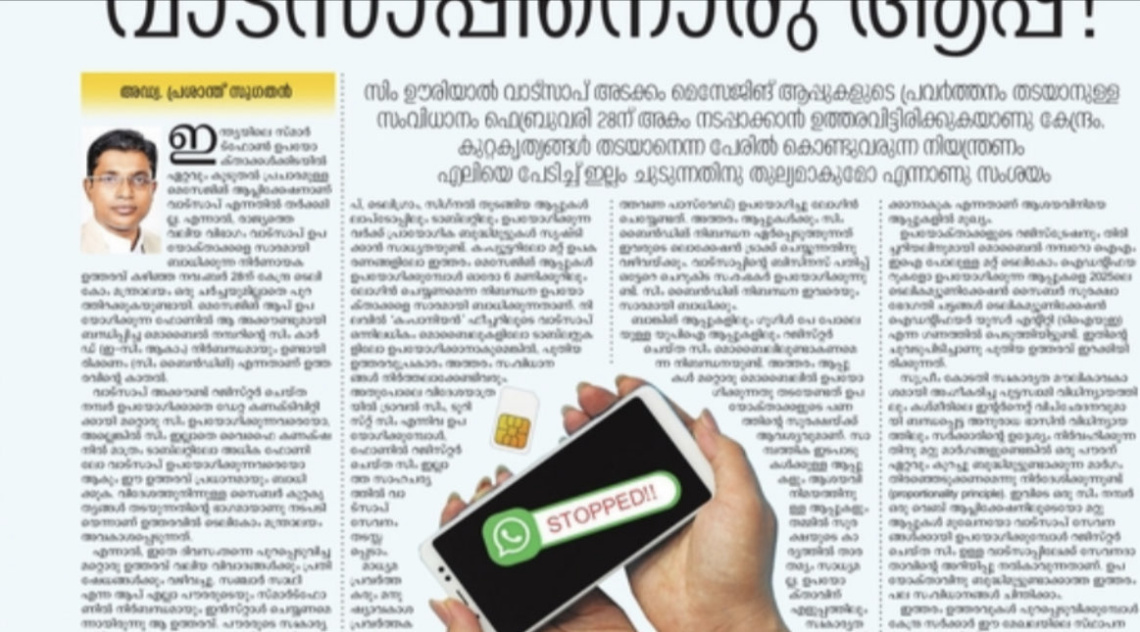On day 12 (Wednesday, 21st February 2018) of the final hearing, Senior advocate Gopal Subramanium resumed his arguments emphasizing upon constitutional value of human dignity. He began with referring to the decision in Subramanian Swamy v. Union of India which recognizes the concept of reputation as a natural right- a facet of dignity. He then went on to underline the relation of fairness and justice to dignity and the need for proportionality.
In the light of several instances where the lack of authentication has led to deprivation which in turn has led to indebtedness, Mr. Subramanium questioned if the legislation in consideration is compliant with principles of justice and accountability.
On Justice D.Y Chandrachud’s question on the difference between identity and identification and whether identification under the Act impaired the right to identity, Senior Advocate Gopal Subramanium clarified saying that he will be taking a doctrinal position. He agreed that people should have a political identity. However, he mentioned that there are two different expressions- ‘identity’ & ‘identification’ and it is the former which has constitutional relevance. Mr. Subramanium further submitted that minimal or regulatory identification is acceptable but identification for availing rights is not.
Mr. Subramanium then walked the bench through anomalies in the Aadhaar Act. He emphasized on the fact that Aadhaar Act has an element of objectification. It depersonalizes an individual and eliminates any form of transaction except through the medium of this Act. He submitted that a person can exist independent of Aadhaar and if the Act cannot accommodate that possibility then it is not just.
Mr. Subramanium then spoke about the obligations of a State under Article. 13 of the Constitution to respect the rights of the individuals. He said that the State needs to ensure a better mechanism which makes it accountable and follows due procedure instead of using the present mechanism to find out the ghost people. He further argued that opacity is antagonistic to rationality and that the law must be able to rationalize its objectives.
Mr. Subramanium then submitted that the legislation is deficient in both substantive and procedural reasonability. He then went on to read paragraph 224 from Puttaswamy judgment to strengthen his argument on reasonableness of laws. While pointing out the flaws from the architecture of Aadhaar, Mr. Subramanium submitted that Aadhaar can never be a rational or reasonable method of identification.
Mr. Subramanium then raised the argument of informational privacy. He stated that the statute itself gives evidence that there is an aggregation of data including the meta-data and no guesswork is required to prove that data surveillance is the intent and object of the Act and the regulations. He also read out the excerpts from the Puttaswamy judgment, highlighting potentiality of danger because of State and non-State data surveillance.
Justice Chandrachud then intervened and queried Mr. Subramanium about paragraph 309 from the Puttaswamy judgement which deals with monitoring web for national security. Mr. Subramanium responded by saying that it is different as it talks about monitoring of web and not aggregation. He referred to a hypothetical scenario where data is being aggregated and somebody hacks into the database, asking what would become of the individuals in such a case. He furthered upon it, testing the same situation by the Act under Article 14, 19 and 21. He then submitted that as per section 59 of the Act, there is a remedy in present time and not in retrospection.
Justice Chandrachud pointed out the problems with giving retrospective validity to the actions. Agreeing with him, Mr. Subramanium stated that in case of invasion of fundamental rights, what is without the authority of law cannot be deemed to have been done under the authority of law.
Mr. Subramanium then submitted that Aadhaar is violative of federal nature. He furthered upon this argument referring to the proviso to Article 73(1) of the Constitution which enlists the entries in the concurrent list concerning Aadhaar. He underlined that interface of accountability takes place at the lowest level, state and then union level. He also mentioned that Union had no authority to operate an executive scheme. Mr. Subramanium stated that de-facto and de-jure invasion had taken place in the present case. The invasion is complete and hence, in such a case, a law cannot retrospectively cure such actions.
Bench then questioned Mr. Subramanium on point of law with respect to Section 59. Justice Chandrachud asked him in the context of section 57 if state governments utilised Aadhaar prior to 2016. Mr. Subramanium responded by informing the bench about Memorandums of Understanding (MoU) entered by the state governments to establish State Resident Data Hubs. He pointed out that heart and soul of this Act is authentication and in case of failure of authentication, consequence is disablement. He stated that in such a case, there’s no form of substantive or procedural redressal.
He then submitted that this Act does not have a provision for retrieval of core biometric information. He pointed that in order to compensate for failure to authenticate, it allows the identity holder for updation. However, individuals are not informed when they are required to update.
This marked the conclusion of arguments for the day. Next date of hearing is Thursday, 22nd February, 2018.


